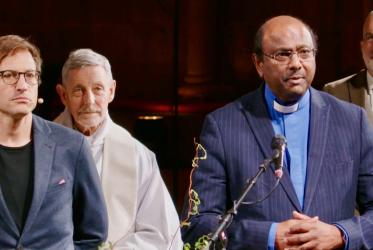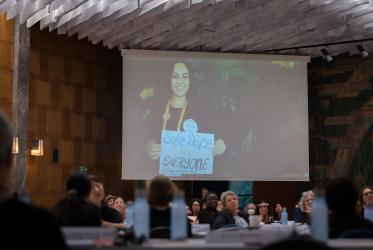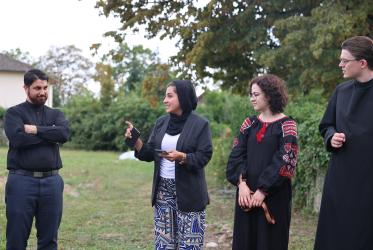*By Rhoda Mphande
Young people are trailblazers, pioneers, visionaries and leaders who have the potential to create a positive, sustainable legacy for future generations on a global scale.
On 12 August, International Youth Day, youth led a TED-style talk and discussion in Geneva, with five young speakers from different parts of the world, four virtually and one live. The stories and experiences shared connected them to theme “Transforming Education,” while inspiring the audience for a call to action.
Azeez Sadeq, Youth on Migration and Refugee Crisis
Photo: WCC
Sadeq, 23 years old, a victim of war, is living evidence of how education transformed his life as he shared his experience of being a refugee from Iraq who has been living in France since 2014. He said: “Education gave me hope and a new meaning to life after losing everything in my country.”
Integrating into a new way of living, language and culture in France has been very challenging, he said. Public schools refused to enrol him and private schools did not believe that they could help him transform his life through education. However, all this changed because of one teacher who believed in him, teaching him how to speak French as the first step to easily communicate in his new home.
He believes that education opportunities are there for refugees and indeed can transform lives even though the cost cannot always be afforded by all. His call to action is to urge educational institutions to also see the human side of migrants and refugees - as people who have dreams, goals and visions for a better future. He is also thankful for his church which supported him in his journey.
Jennifer Muthoki from Kenya, Youth on Radical Extremism
Photo: WCC
Muthoki is a vibrant graduate in international relations, diplomacy, and information technology from Kenya, a member of the student Christian movement, and an intern with the World Student Christian Federation.
In the context of Kenya, she believes that radical extremism lures young people due to their quest of status and sense of belonging. She pointed out that “some women encourage their young men to man up and join such groups.” Poverty and unemployment is also a key factor as radical extremist groups usually offer a solution to financial and economic struggles to young people who remain unemployed.
Religious messaging is also used by religious leaders who use such platforms to advance extreme messages that end up radicalizing young people.
Her call for action is that “youth should not be perceived as victims and perpetrators only but also partners for constructive change.” She urges parents to build the self-esteem of children from a young age so that they do not seek an identity elsewhere. She further calls for inter-religious and inter-cultural dialogues and promoting resilience to radical extremism in Kenya.
Islam Khadijah from United States, Lutheran World Federation Young Reformer on Gender Justice

Photo: WCC
“Economies grow stronger when women are full participants in society”, Khadijah said, while adding that achieving gender balance in the global political sphere has the potential to bring about real action and change in areas of reproductive rights, response to gender-based violence and even aspects of climate change, and that men are not excused from this work either in solidarity with women as their masculinities have helped to build the barriers in the first place.
Khadijah has worked in the USA and Rwanda for organizations that promote gender justice, an issue that is close to her heart.
She quoted Corita Kent, a women’s rights activist, saying: “Women’s liberation is the liberation of the feminine in the man and the masculine in the woman.”
Her call to action pointed out that “this work is internal and external. While we dismantle oppressive structures in our pursuit of a better world, we also have to work on dismantling and redefining what our rules will become in that world. We should not hesitate to go after the glass ceiling and take the whole house down with it. There is no small act when it comes to this work. There must be room for everyone in any work towards equality.”
Maria Camilla Uloa from Colombia, Youth on Higher Education
Photo: WCC
As education opportunities are limited in Colombia, Uloa, 22 years old, had no choice but to move to Argentina to complete her university studies.
“Poverty is one of the main factors that contributes to lack of higher education in Latin America,” she said. One of the challenges she added is that “young people are continuously asking the government for more financial resources for them to pay for their tuition fees and some parents even go to the extent of taking loans from banks in order to afford university fees for higher education and end up in debt.”
Linked to the limited financial resources for higher education is the lack of employment for young people after they complete their studies.
Her call to action encouraged the young people who are marching in Chile, Colombia, Mexico, Argentina and Brazil for the right to have public universities and public schools to not give up but continue on until the change is implemented. She also voiced a universal call to youth on a global scale to also do the same in different parts of the world where they are affected by lack of resources or access to higher education.
Khulekani Magwaza from South Africa, Lutheran World Federation Young Council Member on Climate Justice
Photo: WCC
“How does this relate to the topic of transforming education?” Magwaza asked. In answering his own question, he said “one of the elements of transforming education is inclusiveness and what climate crisis does is that it creates imbalances between people and communities.” He gave an example of the time when Cape Town declared a national drought in 2015 and many cities in rural areas had already reached “day zero" of no water while people in the developed parts of the city still had water. This was an imbalance as the attention to drought only started when the city was now reaching day zero while all along, there was less attention to the rural areas.
Everyone is affected by the influences, traumas and tragedies of climate change, Magwaza described the climate change issue as “political and ethical.”
Climate crises create unemployment, food insecurity and sustainability issues especially for the next generation, he said.
Magwaza made a call out to not just young people but all people of good will to raise awareness and push governments to take climate action, to mitigate the situation and create resilient communities and societies as he believes that this is the responsibility that we have as people of God.
World Council of Churches deputy general secretary Prof. Dr Isabel Apawo Phiri commented, “I cite the remarkable characteristics of your generation, born around the turn of the millennium. It is not just that you are more diverse, more tech savvy, more metropolitan, or better educated than generations before you. It is rather that this generation seems to prize cooperation over competition, inclusion over exclusion, community engagement over individual passivity, and making a contribution over the narrow ambitions of making a career. The power of today’s youth holds enormous potential for good.”
*Rhoda Mphande is a Communications Intern at The World Council of Churches
Photo Gallery from the International Youth day celebration in Geneva 12 August 2019
WCC to youth: "Is this the world we bequeath to you?"- WCC press release 12 August 2019
Deputy General Secretary Youth Day Greetings 2019









